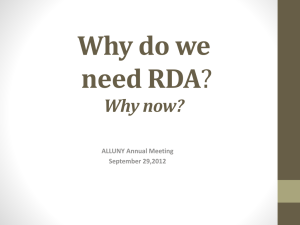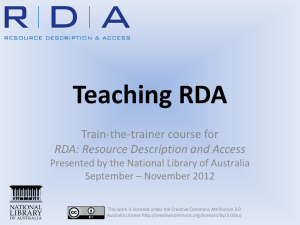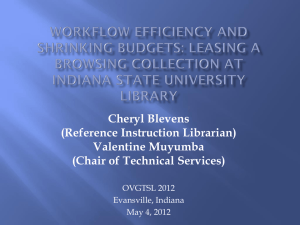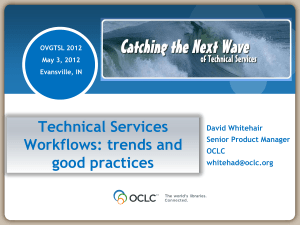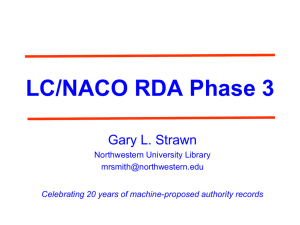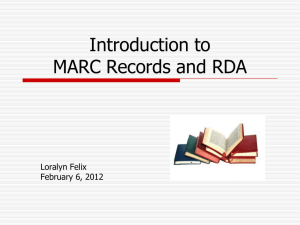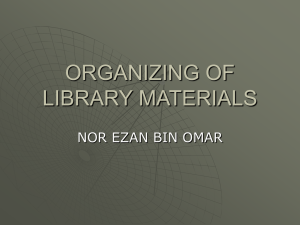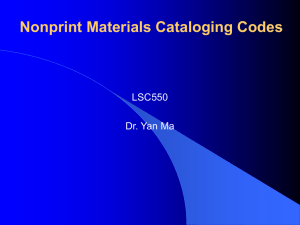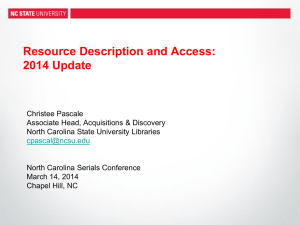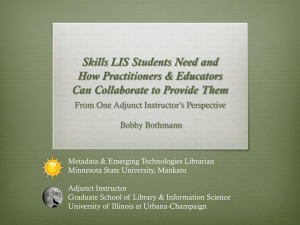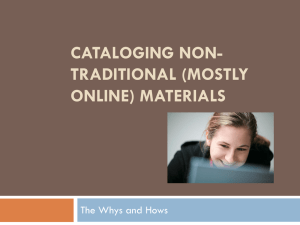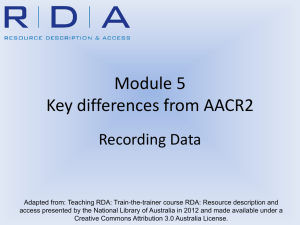NOOBS FTW! A discussion of challenges & resources for
advertisement
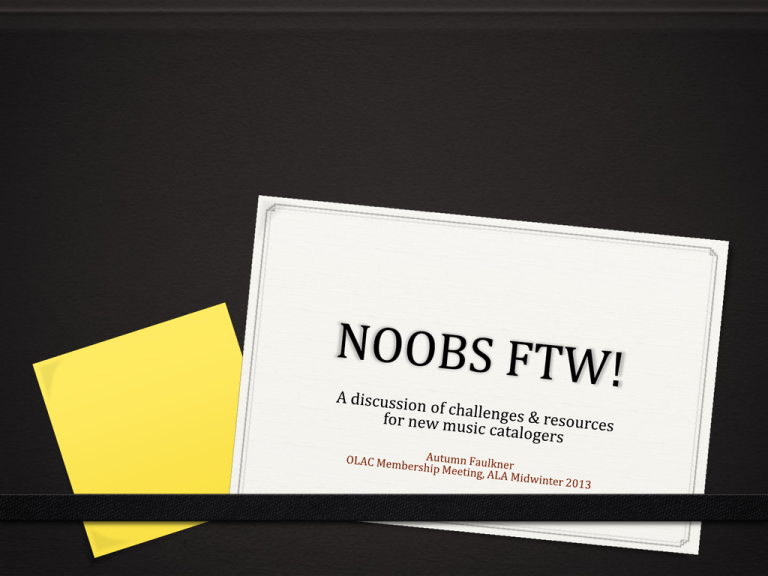
Who am I? 0 Graduated with MLIS in December 2011 0 Started at Michigan State in March 2012 0 Cataloging special items: non-Latin scripts, music CDs, scores, etc. 0 Still more noob than expert source Music expertise? No degree, but extensive background in piano and voice. Um…what is a noob? NEWBIE New to cataloging New to music cataloging NEWBIE SERIOUS NOOB Why do you need to know any of this? 0 Often just one music cataloger in a library 0 New music catalogers end up having to teach themselves 0 Understand the challenges, offer support 0 This applies to learning any special format! source What this presentation isn’t 0 A lesson in the particulars of music cataloging 0 More of a general overview of challenges encountered and resources available 0 An attempt to frighten off new catalogers 0 Special formats are FUN! No, really. The Piano Lesson Pierre August Renoir Wait…what is that again? 0 Familiarity with AACR2 MARC21 ISBD LCRIs DCM LCC DDC SCM LCSH NLM NACO SACO CONSER PCC BIBCO RDA LC-PCC PSs standards & guidelines takes a while to develop 0 Content & structure of each 0 Which one to consult when 0 Like looking up words you don’t know in a dictionary source Dealing with funky interfaces Cataloger’s Desktop ClassWeb Learning the system 0 Types of records 0 ILS & bibliographic utility ILS (or LSP) Order record Bib record Item record Modules for different functions: catalog, acquisitions, serials, statistics & reports, global updates, etc. For searching, viewing, maintaining, editing records in local catalog Bib utility Database of bibliographic and authority records For finding copy or creating new record What’s the big deal? 0 Most new catalogers start out on monographs (like me!) 0 Going into music cataloging with monograph mindset totally disorienting scary stuff Parlez vous musique? CHALLENGE # 1 Understanding what you have in hand isn’t always straightforward. 0 This is pretty specialized knowledge even if you have a background in music Fixed fields Numbers & dates • Form of musical composition (what is a zarzuela?!) • Publisher numbers • CD speed, storage, channels • Reprints, rereleases, etc. • Miniature score? Condensed score? • Plate numbers • No date, multiple dates, iffy dates Parlez vous musique? CHALLENGE # 2 Gathering and entering info involves extra steps and complications. 0 You’ll be checking and rechecking a LOT at the beginning. It’s ok to go slowly. Titles • Uniform titles • No collective title • Title from caption or cover? • Don’t forget the GMD! Physical description • Playing time: single work or multiple tracks? • Score? Score and part? Multiple parts? Page numbers for each? Parlez vous musique? CHALLENGE # 3 Certain fields can be a serious time-suck. 0 Aside from the time involved in keying in all this information, I always debate over what exactly to include, why I should include it, and how it should look. Notes • Contents notes: Include times and composers and performers as well as titles? Formatting? • Performer notes: One person playing multiple instruments, multiple people playing same instrument— formatting? Access points • Figure out who all needs an access point: Composers? Performers? Conductors? • Figure out if your catalog has that heading and if not, import it • Some records end up requiring many 700 fields. Parlez vous musique? CHALLENGE # 4 Some music cataloging practices seem arbitrary and illogical. 0 Are you drinking yet? Subject headings • Rules for application (especially for classical music) are complex and accompanied by many exceptions • From Yale music subject headings web page (emphasis mine): “There are two reasons why a form heading would not be qualified by medium of performance: 1. because the medium of performance is implied in the form; 2. for some unknown, mysterious reason, the Library of Congress has decided that a particular form heading should not be qualified by medium of performance.” Why this is difficult source 0 You’re still learning cataloging basics, and these are advanced cataloging issues 0 Cataloging monographs is somewhat intuitive; that is not necessarily true of special formats 0 You may lack familiarity with music and/or cataloging terminology 0 BUT THAT’S OK! I’ll be honest. I still don’t know what a zarzuela is. CAUTION Heavy bias toward AACR2 ahead The battle plan •AACR2 (Chapters 5 & 6) •RDA (several chapters) •Subject Headings Manual (H 1917.5) •Your catalog •LC catalog •Yale catalog •Webinars •Slides •In-person workshops STANDARDS TRAINING EXAMPLES BEST PRACTICES •OLAC •MLA—national & local •MOUG •Yale The secret weapon CHEAT SHEETS! Give me the inside scoop source 0 A lot of our standards need further interpretation and community discussion 0 Can’t just read AACR2 & RDA and be done with it, especially not by yourself 0 So where do I start? Get some training source 0 California Library Association webinar 0 Cataloging Musical Scores and Sound Recordings Workshop (2012) 0 $95, includes video & slides 0 8 hours 0 Kathy Glennan webinars 0 RDA & Music Basics: Sound Recordings (2011) 0 RDA & Music Basics: Scores (2011) 0 Freely available through ALCTS, includes video & slides 0 1 hour each 0 Jay Weitz slides 0 Sound Recordings Cataloging Workshop (2012) 0 Freely available slides through OLAC 0 OLAC workshops 0 Membership: $20 (!!!) 0 Conference registration: $199 (2012) Find your Yoda. Read best practices documentation Yale University Music Cataloging MLA Music Cataloging Bulletin $35/year MOUG listserv OLAC listserv MOUG cataloging tools Jay Weitz’s Q&A column in the MOUG Newsletter Look at a million examples 0 Learn through repetition! 0 Be sure to check record creation dates—do these examples reflect most current practice? 0 Print the most helpful examples for quick reference Make cheat sheets! 0 Quick reference best way to learn, in my humble opinion 0 Create your own or use existing: www.autumnfaulkner.com 0 Available sheets: 0 0 0 0 0 Scores (AACR2) Sound recordings (AACR2) MARC codes General cataloging reminders AACR2/RDA changes from SLC’s cheat sheet page 0 Revisions and additions will probably be forthcoming in April-ish What about RDA? 0 Think of all the years people have been contributing to discussion and documentation about AACR2 music cataloging. 0 Patience, grasshopper! 0 Expect to hear more from music cataloging communities as RDA is implemented and revised. 0 Use the same battle plan: 1. Standards 2. Training 3. Examples 4. Best practices source AACR2 the zombie standard Maaaaaaaaaaiiiiiiiiinnnnnn entries… Straddling two worlds 0 Noobs must be familiar with AACR2 as well as RDA 0 We’ll have to be translators 0 Legacy records will form a large part of our workflow even post-RDA 0 Copy cataloging our library plans to continue accepting AACR2 copy indefinitely 0 Some things will remain the same between AACR2 and RDA good to understand basis of continued practices How you can help 0 Be aware of the challenges noobs face 0 Learning all the regular stuff + not one but two standards + special formats 0 Share resources and provide encouragement
